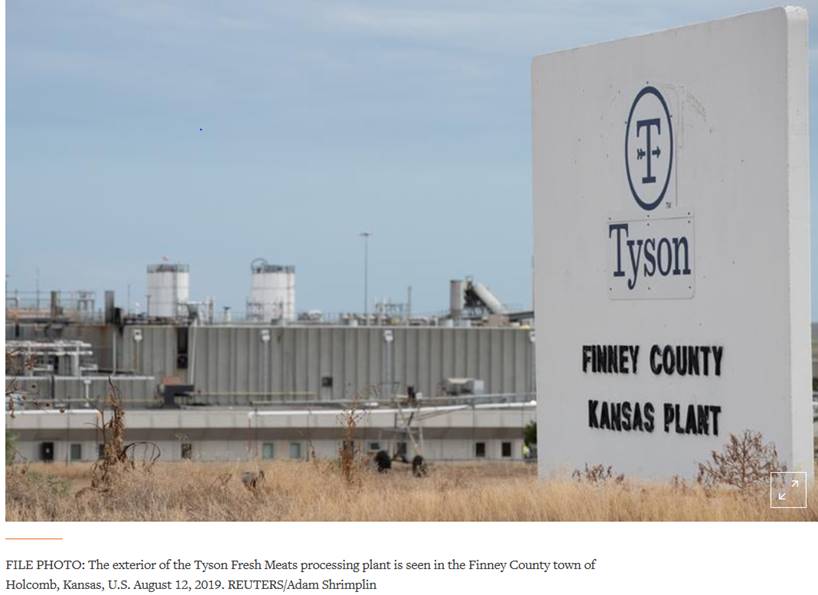Reuters: Tyson Foods workers to replace some federal inspectors at U.S. beef plant
Tyson Foods workers to replace some federal inspectors at U.S. beef plant
By Tom Polansek
CHICAGO (Reuters) – Tyson Foods TSN.N said on Tuesday it plans in January to have company employees take on duties from more than a dozen federal inspectors at a large Kansas beef plant, after getting a U.S. government waiver.
FILE PHOTO: The exterior of the Tyson Fresh Meats processing plant is seen in the Finney County town of Holcomb, Kansas, U.S. August 12, 2019. REUTERS/Adam Shrimplin
Tyson said the change would improve food safety and efficiency as part of a process to modernize inspections, although activists worried it could result in less oversight.
The country’s highest-selling meat supplier asked the U.S. Department of Agriculture (USDA) in March 2019 for a waiver from inspection requirements at its plant in Holcomb, Kansas. Other companies have made similar changes at chicken and pork plants.
The USDA granted the waiver in March 2020, allowing Tyson workers instead of government inspectors to check cattle carcasses for defects or disease before the animals are butchered, company executives said.
The USDA said in a statement to Reuters that it will continue to inspect all carcasses and parts, while shifting “quality assurance and trimming tasks” to Tyson.
The pandemic delayed the changes, but Tyson will now hire 15 people per shift to check carcasses, according to the company, which worked with Iowa State University to develop training materials for workers.
The total number of USDA inspectors at the plant will drop, although there will be more highly trained inspectors who do more complex work like monitoring animal welfare or meat testing, according to the agency.
Tyson aims to eventually use cameras and computer imaging to evaluate carcasses, said Jennifer Williams, vice president of food safety.
“This is a way to leverage new technology and plant employees to implement these steps, that will free up some inspectors to focus on improving public health, animal welfare and food safety,” said James Roth, director of Iowa State’s Center for Food Security and Public Health.
Meatpackers accelerated automation after COVID-19 infected thousands of slaughterhouse employees. USDA inspectors were also infected.
Activists said the inspection changes were a move toward deregulation.
“It’s really problematic,” said Zach Corrigan, a Food & Water Watch senior staff attorney.
Reporting by Tom Polansek; editing by Richard Pullin
